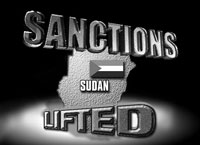Misleading Congress On Sudan (BlackElectorate.com)

KHARTOUM, Sudan (PANA)–Secretary of State Colin Powell recently reiterated to visiting Sudanese Foreign Minister Mustafa Osman Ismail that economic sanctions against Khartoum would only be lifted after an accord has been signed with southern rebel group.
“The Secretary of State told me that economic sanctions against us could be lifted immediately after a draft peace agreement is signed between Sudan and its southern adversaries,” local press organs quoted the Sudanese minister as saying in Washington on May 26.
The Sudanese minister had gone to Washington hoping for relief in view of the progress being made in negotiations with the Sudan People’s Liberation Army/Movement (SPLA/M) in Kenya. Former President Bill Clinton’s administration had imposed the sanctions in 1997. Mr. Powell’s remarks came a day after a top Sudanese leader predicted a peace accord with John Garang’s SPLA/M by June.
Sudan-U.S. relations plunged to their lowest level in 1991-92 when the government in Khartoum sided with Iraq’s Saddam Hussein during the first Gulf war. For nearly a decade, the government, then jointly led by President Omar el-Bashir and the fervent Islamist Hassan Al-Turabi, remained a pariah state in the eyes of the United States. Mr. Turabi has since been disassociated from the government and placed under house arrest.
Sudan was accused of creating training camps for terrorists, waging a war to crush a rebellion and imposing Islam on the mostly Black southern part of the country. Relations soured further when the U.S. launched air strikes on a Sudanese site believed to be producing chemical weapons in 1998. The strikes were seen to be in retaliation for the terrorist bombing of U.S. embassies of Kenya and Tanzania.
By the time terrorists slammed passenger planes into the two towers of the World Trade Center in New York on September 11, 2001, Sudan had moved far enough to escape being placed on a list of states that supported terrorism.
In late April this year, President George W. Bush said he will not slap sanctions on Sudan because it was negotiating in good faith with John Garang’s rebels. He urged both sides to “replace promises” with actions.
“There is still much work remaining,” he said in a statement. “It is now time to move the peace process to a new level where the actions of both parties replace promises as the measure of their commitment to peace,” Mr. Bush had said.
Mr. Bush had also said the Sudan People’s Liberation Army/Movement was also committed to reaching an agreement. The two sides signed a cease-fire agreement in Machakos, Kenya, last October. That Protocol provides for a six-year period of autonomy for the SPLA/M-controlled south ahead of a referendum on the region’s political future.
Sudan’s civil war has, since 1983, pitted the Khartoum government, representing the mainly Islamic Arab north of the country, against the SPLA, based in the mainly Christian and animist south.
The conflict is estimated to have claimed two million lives and displaced four million people since 1983.
Under the Sudan Peace Act, the U.S. president must evaluate, every six months, whether the government and the rebel SPLA/M are pursuing peace talks in good faith. If he finds that the government has “unreasonably interfered with humanitarian efforts” in the south, then Washington will vote against multilateral loans to Sudan and consider downgrading or suspending diplomatic ties.
Under the peace act, the United States will also try to prevent Sudan from using oil revenues to acquire weapons and seek a UN Security Council resolution imposing an arms embargo on Khartoum.
The legislation also authorizes the administration to spend $100 million between 2003-2005 to improve conditions in areas of Sudan not under government control.
Sudan is already subject to U.S. sanctions because the State Department has not removed its name from the list of states that sponsor terrorism, even if officials in Washington have noted that Khartoum has made progress on that front.












